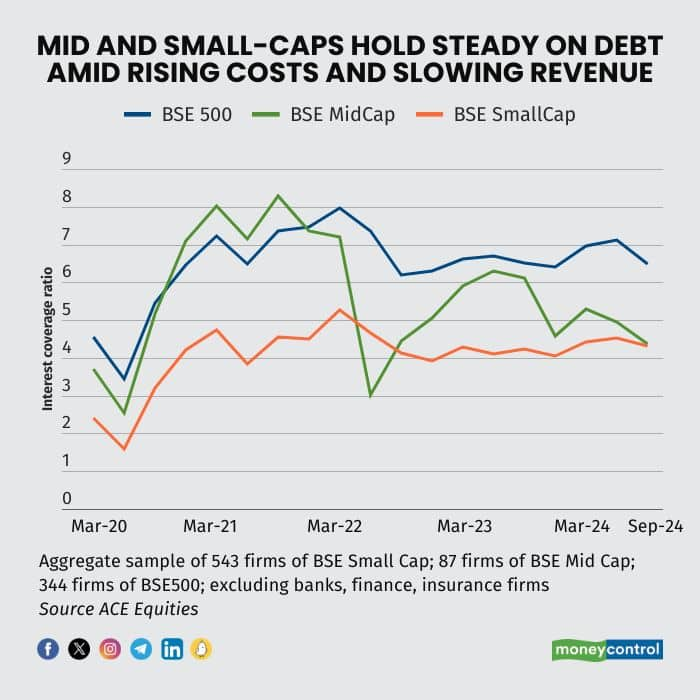



Despite slower profit and revenue growth and elevated interest rates, listed companies have been able to maintain their ability to service debt more than comfortably, unlike in the previous economic cycle when high leverage started to take a toll on companies when the downturn hit.
A Moneycontrol analysis of the September quarter earnings shows that the interest-coverage ratio (ICR) for large, mid-sized, and smaller firms declined only slightly compared to the June quarter but remained in a safe range of 4-5. ICR is interest expense as a percentage of operating profit exclusive of depreciation which is a non-cash expense. It is a measure to guage the ability of a company to service debt.
Specifically, the ICR for 87 BSE Midcap companies and 543 BSE Smallcap companies fell to 4.37 and 4.32, respectively, down from 4.96 and 4.53 in the June quarter, according to ACE Equities. In contrast, the ICR for 344 firms of BSE 500 companies decreased to 6.48 from 7.12. The analysis excludes banks, financials, insurance, and oil and gas companies.

Experts note that despite slowing credit growth amid higher interest rates, smaller firms have managed debt repayment as successfully as their larger peers, amid subdued revenue, and profit growth. Analysts attribute the stability to alternative funding strategies. Companies are tapping equity markets and reducing promoter stakes, using preferential issues and qualified institutional placements amid bullish sentiments, helping them sustain a strong debt-service position despite pressure on profitability and sluggish revenue.
In 2024 so far, companies raised over Rs 70,000 crore through preferential issues, up from Rs 67,173 crore in 2023. Additionally, 68 firms have secured Rs 1.04 lakh crore through qualified institutional placements (QIPs) this year, a significant increase compared to Rs 49,435 crore raised in the previous year.
"The buoyant and bullish markets of the last three years have helped a lot of these firms to avoid bank debt. With the ease of raising money via QIPs and preferential issuances in a strong bull market, we have seen record companies go those routes in the last three years. And, that approach of mastering the market cycle has helped ensure ample cash in the books of these companies to service existing debts despite declining earnings growth in the last two quarters", said Jayant Mundhra, an independent research analyst.
Both India's flagship indices Sensex and Nifty jumped nearly 32 percent each since April 2023 till date while BSE midcap and smallcap gained 83 percent and 93 percent respectively.
However, going ahead, rising commodity prices amid ongoing geopolitical tensions are expected to pressure domestic as well as global markets. Analysts expect this environment to lead to increased debt servicing challenges for midcap and smallcap companies if geopolitical tensions persist following Donald Trump’s US presidential victory.
The RBI’s latest scheduled banks’ statement shows that bank credit growth has moderated to 14.1 percent y-o-y as of October 4 this year, from around 16.0-16.5 percent at end-March. Recently ICRA has estimated the incremental bank credit growth to slow down to Rs 19 lakh crore -20.5 lakh crore in 2024-25, around a 12 per cent Year-on-Year (YoY) growth, compared to Rs 22.3 lakh crore, or 16.3 per cent rise.
Moneycontrol data reveals that 87 mid-cap companies have reported single-digit revenue growth for seven consecutive quarters, with net profit slipping into negative growth for the second quarter in a row. For the first time in 10 quarters, other income also showed negative growth, and operating profit saw its first negative growth in eight quarters. Total expenses reached a 10-quarter high, yet operating profit hit a two-quarter high despite rising costs.
For the 543 companies on the BSE SmallCap index, revenue growth has remained in single digits for six consecutive quarters, with net profit showing its slowest increase in that period. The operating profit margin reached 15.19 percent, its lowest in three quarters. Similarly, among the 344 companies in the BSE 500, revenue growth was the slowest in 15 quarters, while both operating profit and net profit growth were the weakest in six quarters, with operating profit margin hitting a three-quarter low.
Discover the latest Business News, Sensex, and Nifty updates. Obtain Personal Finance insights, tax queries, and expert opinions on Moneycontrol or download the Moneycontrol App to stay updated!
Find the best of Al News in one place, specially curated for you every weekend.
Stay on top of the latest tech trends and biggest startup news.